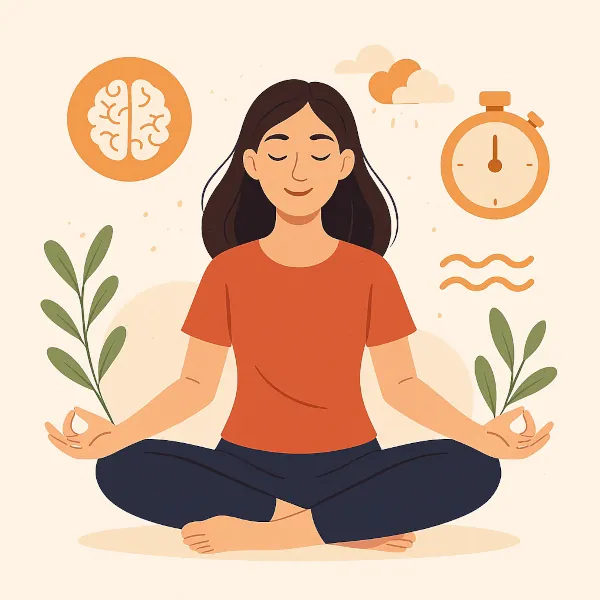Did you know that over 70% of people report feeling stressed daily? Reducing stress is one of the biggest challenges of modern life. In the fast pace of everyday routines, both the body and mind suffer from the consequences of overstimulation, responsibilities, and constant worries. The good news is that there are effective techniques that can be applied today to relieve stress and improve mental well-being. 🌿
Why Has Stress Become So Common? 🤯
Have you ever wondered why so many people feel constantly pressured or overwhelmed? Chronic stress is directly related to today’s lifestyle: overwork, constant connectivity, poor diet, lack of sleep, and little physical activity.
💡 Fun Fact: Studies indicate that around 70% of people report daily stress (source: American Psychological Association).
Social media also contributes to constant comparison with others, leading to anxiety and low self-esteem. The culture of extreme productivity reinforces the idea that being busy all the time equals success, increasing psychological pressure.
How Does Stress Work in the Body? 🧠
When we are stressed, the body releases hormones like cortisol and adrenaline. These compounds are essential in danger situations, but when produced in excess, they can lead to health issues such as insomnia, anxiety, depression, reduced immunity, and cardiovascular diseases.
The autonomic nervous system stays in a constant alert state, making it hard to relax. Digestion is impaired, sleep becomes shallow and fragmented, and there’s a tendency to consume substances like alcohol, nicotine, and ultra-processed foods, which worsen the situation.
Effective Techniques to Reduce Stress 🌈
Check out the best strategies to relieve stress and restore emotional balance:
1. Mindfulness Practice 🧘♂️
Mindfulness helps focus on the present moment, reducing negative thoughts and anxiety. For beginners, apps like Headspace, Insight Timer, or Calm offer guided meditations that are practical and accessible. Practicing just 10 minutes a day already brings measurable benefits.
You can also apply mindfulness to simple activities like brushing your teeth, eating, or walking, by paying attention to bodily sensations, breathing, and surroundings.
2. Regular Physical Exercise 🏃♀️
Activities like walking, running, dancing, and yoga release endorphins—neurotransmitters responsible for feelings of pleasure and relaxation.
Regular physical activity also improves sleep quality, strengthens the immune system, and helps maintain focus and concentration throughout the day. Aim for at least 30 minutes of moderate activity most days of the week.
3. Breathing Techniques 🌬️
Deep, rhythmic breathing helps calm the nervous system. Try this: inhale for 4 seconds, hold for 4, exhale for 4, and repeat for 2 minutes.
Other popular methods include alternate nostril breathing (pranayama) from yoga and the 4-7-8 technique, which induces deep relaxation.
4. Quality Sleep 😴
Good sleep is essential for physical and emotional recovery. Try to maintain a consistent sleep schedule, avoid screens before bedtime, and create a dark, quiet environment.
Additional tips: avoid heavy meals at night, reduce caffeine after 4 PM, and create a pre-sleep ritual like a warm bath or light reading.
5. Balanced Diet 🥑🍌
Foods rich in tryptophan—like bananas, oats, nuts, and eggs—as well as sources of omega-3, magnesium, and B vitamins, support proper nervous system function.
Also include antioxidant-rich foods like berries, dark green vegetables, and seeds. Avoid ultra-processed foods, excess sugar, and alcohol, as they increase irritability and fatigue.
6. Therapy and Self-Care 💬🛁
Talking to a psychologist, journaling, or making time for enjoyable activities are valuable ways to deal with built-up emotions.
Cognitive Behavioral Therapy (CBT) has proven highly effective in reducing stress. Self-care can include aromatic baths, gardening, art, music, or any activity that brings joy.
7. Quality Time With Loved Ones 👨👩👧
Maintaining healthy social connections is key to reducing stress. Heartfelt conversations, leisure time with friends or family, and even hugs help release oxytocin—the well-being hormone.
8. Reducing Digital Device Use 📵
Spending many hours on phones or computers leads to mental overload. Set specific usage times and create moments of disconnection to recharge.
How to Start Today? 🗓️
- Choose one technique from the list and start with 10 minutes a day.
- Try different methods until you find what works best for you.
- Use visual reminders at home or work to reinforce the habit.
- Share with someone close to practice together.
How to Apply in Daily Life? 📆
- Practice mindful breathing during work breaks.
- Use meditation apps before bed.
- Turn your morning walk into a moment of mindfulness.
- Prepare your meals calmly and attentively, as a moment of pause.
- Create a relaxing space at home—with cushions, plants, and soft music.
Extra Tip 🍵
Avoid excess caffeine, as it can intensify stress symptoms. Try calming teas like chamomile, fennel, lavender, or passionflower instead.
Conclusion ✅
Reducing stress is a process that requires practice and consistency, but the benefits are significant: greater mental clarity, emotional health, and quality of life. Start today with small steps and see how you can transform your routine.
📢 Share this content with someone going through a stressful moment who could benefit from these tips.

